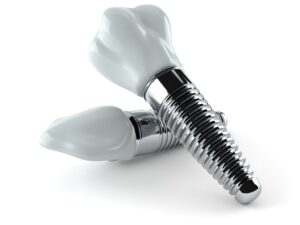Dental Implants
Dental implants are used to replace missing teeth by serving as the replacement for the root portion of a missing natural tooth. Dental implants are small tissue-compatible surgical grade titanium fixtures. They are inserted into either the upper or lower jaw bone. These new teeth will match the colours and contours of the existing teeth.
How does a dental implant work?
It is an accident of nature that titanium is not rejected by the body’s immune system. IN fact the bone cells actively grow onto the implant surface and lock it into place. This period of natural bonding is referred to as ‘Osseo integration’. The integrated fixtures then become like secure new tooth roots upon which crown, bridge or denture can be held in place. Implants can replace a single tooth or a whole mouthful of missing teeth.
Am I a suitable candidate for a dental implant?
A few medical conditions prevent the use of implants but these are rare. There is no age limit and elderly patients are often quite suitable. However implants need enough good quality bone to lock into. Certain individuals may not have enough bone in the right place or the bone may be too fragile to support an implant. This can sometimes be overcome by bone grafting procedures.

